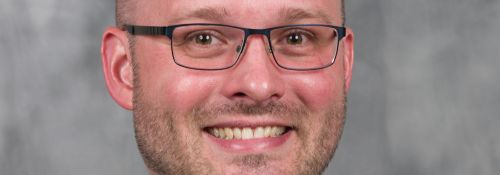
Harmony and History: Musicologist Derek Stauff Blends Music and Research
When you walk into Assistant Professor of Music Derek Stauff’s office, you will notice shelf after shelf of books, each meticulously coordinated by color. How fitting, then, that such a harmonious arrangement belongs to Stauff, an organist and a musicologist who teaches music history, harmonizing this universal discipline within the context of the liberal arts.
Stauff, who hails originally from eastern Pennsylvania, starting taking piano lessons at the age of five. He added organ lessons in high school and continued his organ studies at Grove City College. As a music education major, Stauff considered becoming a music teacher or choir director. Because he was “well-practiced” in playing the organ, Stauff entered graduate school at Indiana University to earn a master’s degree in organ performance. Along the way, he also developed an interest in music history, and simultaneously earned a master’s degree in musicology. He completed his education with a Ph.D. in the same subject, focusing on 17th-century Baroque music. While in graduate school, Stauff was first exposed to Hillsdale College: he met and married fellow musicologist Mariel Johnson, ’05.
Stauff recalls that in his first week of teaching at Hillsdale, he wondered if his students could handle the rigor of music history. “Music history involves lots of research and writing,” he explains. “Previously, I had taught seniors or graduate students who were very musically experienced, with a full conservatory-style undergraduate curriculum under their belts, but who needed to improve their academic skills. These students often did not see the value of academic coursework.” To his delight, however, Stauff discovered that Hillsdale students were up for the challenge. “I found that though many of my students have not gone through the full gamut of conservatory-style curriculum, they often make up for this with academic talent and creativity,” he says. “Furthermore, they are discovering that the skills they learn in my classes will serve them well whether or not they go into the performance field.”
“Dr. Stauff challenges us not only with the work load, but with the quality of work expected,” junior music major Sarah Chavey says. “Because he requires us to work so hard, my first ‘A’ was even sweeter than usual.”
This year, Stauff taught beginning and advanced sections of Understanding Music (for non-music majors), the two-semester music history sequence, and a senior seminar based on his research. Last fall, he taught a class on Bach’s keyboard music. “Next fall, I’ll be teaching a seminar on Handel’s Messiah, to coincide with the choir and orchestra’s production of Messiah,” he says. “I’ll also offer a one-credit class on the Messiah open to anyone.” In keeping with the Music Department’s policy of welcoming students of all majors, Stauff hopes to develop more classes and seminars geared toward a general audience.
As an organist, Stauff has played occasionally for Sunday services at College Baptist Church, and he has also played with the College Choir and at the All-College Convocation. He eagerly anticipates Hillsdale’s proposed chapel, which will include two organs. “I want to help develop a stronger program in sacred music at Hillsdale,” he says, and the chapel will provide the perfect foundation on which to do that.
In the meantime, Hillsdale students will certainly grow in their knowledge and appreciation of sacred music and music history thanks to Stauff’s teaching. “While listening to classical music on the radio recently, I realized I was trying to figure out who the composer was, a challenge that had never crossed my mind before I took Dr. Stauff’s class,” Chavey says. “I was excited when I realized I had figured it out correctly.”
Printed in the Spring 2016 Alumni Magazine